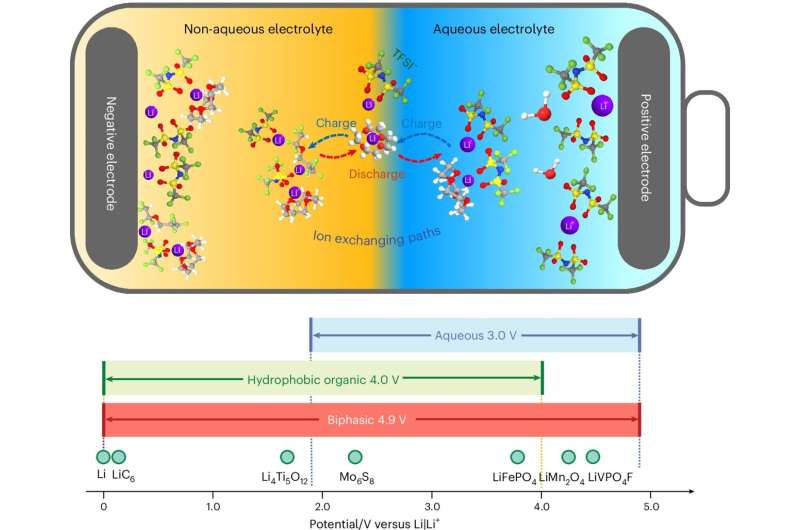Water-based battery offers 2,000-cycle stability
A team of chemical and biomolecular engineers, physicists and battery specialists affiliated with several institutions in the U.S. has developed a water-based battery that offers 2,000-cycle stability. In their paper published in the journal Nature Nanotechnology, the group outlines why they believe it could help bridge the gap between aqueous batteries and non-aqueous lithium-ion batteries.
The main advantage of using aqueous batteries is their safety compared to nonaqueous, lithium-ion batteries. They cannot ignite unexpectedly, minimizing fire hazard. The reason that they are not common is their reduction potential limit of aqueous electrolytes, which has restricted their energy density. Also, the current types of electrolytes they use tend to have problems with water shuttling the interface and high impedance.
In this new study, the research team has taken a step toward resolving these problems by improving ion transport and the stability of biphasic electrolytes via lithium ionophores.
To make their new battery, the researchers employed Li+ (ionophore) nanoclusters using 12-crown-4 (12C4) and tetraglyme (G4) as a means of enhancing the battery’s biphasic electrolytes. They were able to do so by developing an aqueous/organic two-layer electrolyte, which led to a reduction in resistance and a means for mixing the non-aqueous and aqueous phases courtesy of lithophilic ionophores.
During both aqueous and non-aqueous phases, this overcame interface challenges facing other aqueous battery electrolytes. It also allowed the battery to achieve both low impedance (2.7 Ω cm−2) and a high cycle life (2,000 cycles). The resulting battery also demonstrated a stable discharge.
The research team notes that the battery also operates at a voltage of 0.0–4.9 V, thus offering both a cleaner and safer product than other types of batteries. Such batteries should also be more easily recycled. The researchers note that the high life cycle demonstrates exceptionally long-term durability, opening the door to the use of such batteries in new types of applications.
The research team acknowledges that much more work is required before a water-based battery is practical in a wide variety of products, though they suggest their work is a step in the right direction.
More information:
Xiyue Zhang et al, Li+(ionophore) nanoclusters engineered aqueous/non-aqueous biphasic electrolyte solutions for high-potential lithium-based batteries, Nature Nanotechnology (2025). DOI: 10.1038/s41565-025-01898-0
© 2025 Science X Network
Citation:
Water-based battery offers 2,000-cycle stability (2025, April 14)
retrieved 14 April 2025
from https://techxplore.com/news/2025-04-based-battery-stability.html
This document is subject to copyright. Apart from any fair dealing for the purpose of private study or research, no
part may be reproduced without the written permission. The content is provided for information purposes only.

Comments are closed